Iran Supplying Russia With More Weapons For Ukraine War
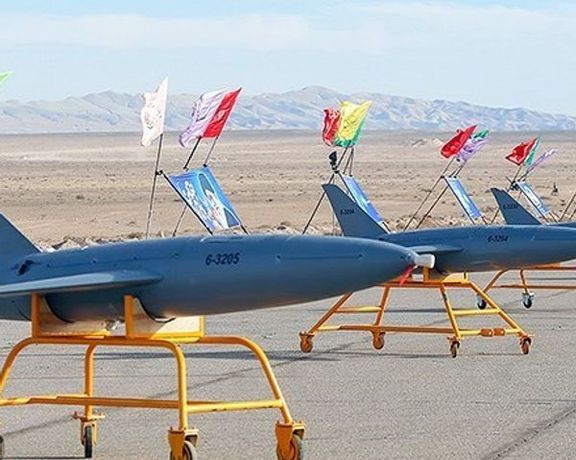
Amid international outcry over the Islamic Republic’s supply of drones and ballistic missiles for the Russian invasion of Ukraine, Kiev says Tehran plans to ship even more arms to Russia.

Amid international outcry over the Islamic Republic’s supply of drones and ballistic missiles for the Russian invasion of Ukraine, Kiev says Tehran plans to ship even more arms to Russia.
According to reports by Ukranian intelligence agencies, the Islamic Republic is set to deliver more than 200 Shahed-136 and Arash-2 kamikaze drones, and Mohajer-6 reconnaissance and combat UAVs later in November.
“It is known that the supply of these UAVs will be carried out over the Caspian Sea to the port of Astrakhan,” the Ukrainian intelligence agency said, adding that “The drones will arrive disassembled. Later, on the territory of Russia, they will be assembled, repainted and applied with Russian markings,” the report says. Russia applies its own markings to the Shahed-131 and the Shahed-136, dubbing them the Geran-1 and Geran-2 respectively – apparently to obscure their Iranian origins.
According to a report by CNN, Tehran is preparing to send approximately 1,000 additional weapons, including surface-to-surface short range ballistic missiles and more attack drones to Russia to use in its war against Ukraine.
The Paris-based dissident organization National Council of Resistance of Iran (NCRI) -- affiliated with exiled People’s Mojahedin Organization of Iran (PMOI/MEK) -- accused the Iranian regime of supplying Vladimir Putin’s army with more than 3,500 drones.
Ukraine, however, said that roughly 400 drones have already been used by Russia, from a total supply of approximately 2,000 weapons. President Volodymyr Zelenskyy announced the downing of 223 drones produced by Iran’s regime.
On Tuesday, the US State Department Spokesperson Ned Price said Washington will “continue to vigorously enforce all US sanctions on both the Russian and Iranian arms trade to make it harder for Iran to sell these weapons to Russia.”
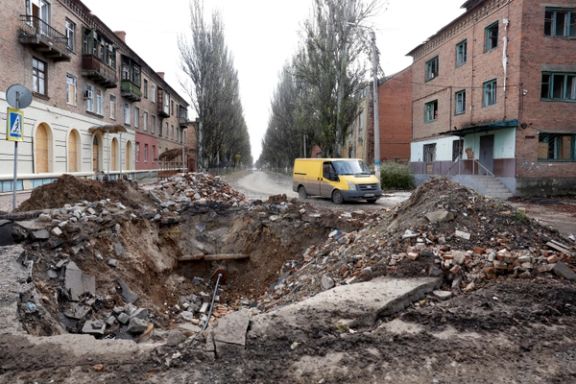
The administration of President Joe Biden struggles to maintain a coherent Iran policy under different pressures heightened by the Ukraine war.
In a press briefing Tuesday United States State Department spokesman Ned Price faced questions as to what the US planned to do over alleged Iranian arms supplies to Russia. His answer over US options at United Nations led to a Twitter feed where his claims were rejected by Gabriel Naronha, Iran advisor 2019-21 during the Trump administration.
Price argued that the US was pursuing “every relevant and appropriate tool in our tool kit” to curb Iran’s reported supply of military drones, including sanctioning Iranian commanders and defense companies.
Price was less than enthusiastic over pushing at the UN Security Council (UNSC) for the ‘snapback’ of UN sanctions against Iran on the basis that such arms supplies violate UNSC resolution 2231, passed in 2015 to endorse the 2015 Iran nuclear agreement, the JCPOA (Joint Comprehensive Plan of Action).
“You know as well as anyone,” Price told a journalist, “that any effort to…stitch together a coalition in the UN Security Council, where you have the belligerent Russia as a permanent member with a veto – that any effort to stitch back together what has expired probably would not fare too well in the UN Security Council.”
The spokesman also suggested US options over snapback were compromised by leaving the JCPOA in 2018. But Price’s description of the mechanics of ‘snapback’ was contradicted by Naronha saying Russia would not hold a veto in such circumstances.
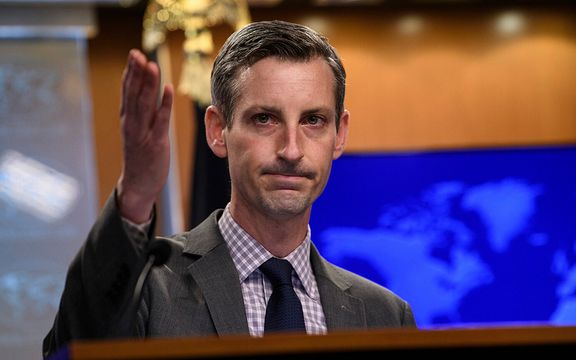
However technical the arguments, any linkage between the Ukraine war and the JCPOA weakens the contention of supporters of the 2015 agreement that nuclear proliferation measures should be dealt with separately.
Pledged to revive the JCPOA, the Biden administration has conducted over a year of talks with Iran without reaching agreement. With negotiations currently frozen, Biden officials – including special envoy Rob Malley in a Carnegie Endowment discussion Monday – have insisted that their intention remains JCPOA restoration.
At the same time, the US is keen that the Ukraine war not escalate. Despite sending at least $17 billion in military aid to Kyiv, Washington has refused advanced weapons. Price said Tuesday that Russia’s military position had been “significantly degraded,” with its “sophisticated weaponry and technology” curbed both through battlefield loses and US restrictions on its international access to chips and sensors needed for drones and missiles.
On the ‘same page’ with Europe
Another US vista, over both Ukraine and Iran, is its relationship with Europe. Malley stressed in his Carnegie Endowment talk on the way the Biden administration had overcome divisions with the Europeans left by the Trump presidency.
While Malley said Monday that reviving the JCPOA was “not our focus now,” he argued that Trump’s maximum pressure “didn’t work” and was “a real-life experiment that failed.” By contrast, he argued “there is nothing we are not doing now because of a possible nuclear deal in the future” and that “we and Europe are completely on the same page when it comes to reacting to Iran's nuclear program.”
The US and Europe, Malley said were “standing together shoulder-to-shoulder and expressing support for the Iranian people at this time when they are confronting the violence of the regime…we really have succeeded in re-stitching what is so crucial if we want to have a common front to push back against Iran's destabilizing activities, human rights violations, or nuclear program.”
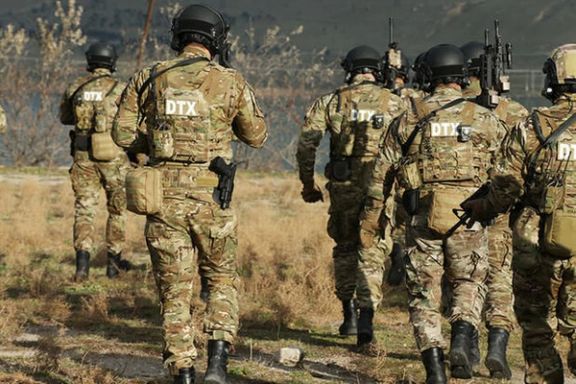
Azerbaijan says it has arrested a group of its citizens who had been “trained and funded by Iran's intelligence” to act against the interests of Azerbaijani national security.
Azerbaijan says it has arrested a group of its citizens who had been “trained and funded by Iran's intelligence” to act against the interests of Azerbaijani national security.
The country’s State Security Service announced on its website Tuesday that the armed group, called the Muslim Unity Movement, was secretly formed by Iran's special intelligence service through the inculcation of "radical-extremist religious ideas."
After recruitment, the members of the group were taken to Tehran through third countries, were given religious nicknames, and were transferred to Syria on military cargo planes with fake documents. In Syria, they underwent military training and received funding.
They were involved in military exercises where they were taught using different firearms and combat tactics as well psychological warfare such as “the use of blackmail.” Following their training, they brought books and videos which propagated "radical, religious-extremist attitudes against the ideas of modern development and a secular state."
Azerbaijan’s State Security Service said the leader of the group was arrested by a court order in 2018 for similar criminal acts. The statement named several of the members of the group, alleging that they are currently hiding in Iran. One of the suspects was arrested while "attempting a terrorist act" against Israeli billionaire Teddy Sagi in Cyprus.
Relations between Baku and Tehran have been tense in recent years, especially after the Islamic Republic sided with Armenia in their territorial disputes. Tehran in the past has also expressed alarm at alleged Israeli military presence in Azerbaijan.
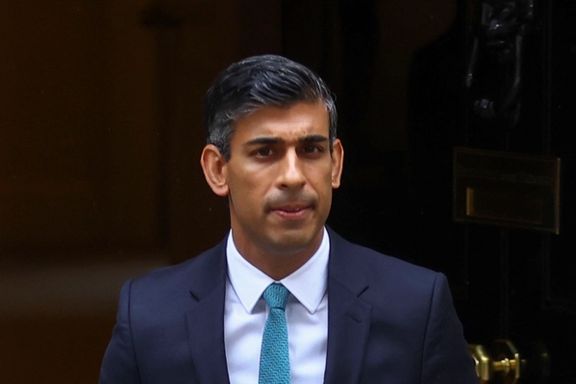
While new British prime minister Rishi Sunak is expected to concentrate on pressing domestic issues, he may change emphasis in Middle East policy.
A member of parliament since only 2015, Sunak has suggested the 2015 Iran nuclear agreement – the JCPOA, Joint Comprehensive Plan of Action – should be strengthened, that Britain should consider moving its Israel embassy to Jerusalem, and that it should strengthen links with Arab monarchies in the Persian Gulf.
Reports of Sunak’s views of Iran come partly from close allies. Former defense secretary Liam Fox told the National newspaper in August said that Sunak was “more hawkish” than the foreign office.
“He would want to see maximum sanctions put on to see whether Iran could be persuaded or forced into a wider agreement that goes beyond just the nuclear program,” Fox said.“He believes the JCPOA doesn’t actually stop Iran's nuclear program, it merely delays it...”
Fox did not explain whether Sunak saw a wider agreement – sometimes called ‘JCPOA+’ and covering security issues like Iran’s ballistic missiles – as a next step from a revived JCPOA or rather as an alternative.
Another ally, Conservative member of parliament Theresa Villiers wrote in the London-based Jewish News in August that Sunak had told her of “his concern that the UK government has not taken the threat posed by Iran seriously enough.”
Sunak has clearly expressed desire for tight relations with the Arab Gulf monarchies and for encouraging more to follow Bahrain and the United Arab Emirates in ‘normalizing’ tries with Israel despite the absence of a Palestinian state. “The UK is in a strong position to leverage its historic relationships with other Gulf states to widen the accords and I would like to see UK diplomats place a greater focus on this,” Sunak told the Jewish Chronicle in August.
Sunak told the Conservative Friends of Israel, also in August, that the UK should consider moving its embassy in recognition of Jerusalem as Israel’s capital. This has been done only by the Guatemala, Honduras, Kosovo, and the United States. Other states, and the European Union, say this pre-empts settlement over Palestinian statehood.
Sunak has also spoken out against rights organizations, including Amnesty International and Human Rights Watch describing Israeli occupation ‘apartheid.’ He has accused the Palestinian Authority of “glorification of terror attacks.”
‘Friends and allies’
Sunak was outspoken over the August 12 attack on author Salman Rushdie in New York state, which he described as a “wake-up call for the west.” But his suggestion as a leadership candidate that those who “vilify Britain” or who were “vocal in their hatred of our country” should be closely monitored proved controversial, at least beyond members of the Conservative Party.
Keeping James Cleverly as foreign secretary, despite a wide reshuffle from the short-lived administration of Liz Truss, may signal Sunak’s desire for continuity in foreign policy at a time of severe domestic challenges and when his government is deeply unpopular.
While Sunak supported Britain leaving the European Union in the 2016 referendum, his early telephone call as prime minister to European Commission president Ursula von der Leyen, when he spoke of “working together as friends and allies,” suggests he may seek a conciliatory relationship.
While the EU has not followed the US over Jerusalem, it has moved closer to the US over Iran policy since Joe Biden became president in January 2021. Rob Malley, the White House Iran envoy, on Monday emphasized the value placed by the Biden administration on the US this improved relationship, both over Iran and the Ukraine crisis, given the divisions of the Trump presidency.
Some suggest that talks to revive the 2015 Iran nuclear deal may revive after the November 8 US mid-term elections. Others feel the talks are at an end. Either way, Sunak’s input may be maintaining close British relationships with both the US and EU.
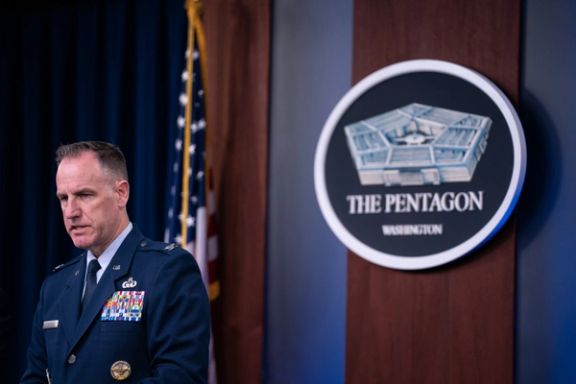
The US has expressed concerns about imminent threats by the Islamic Republic against Saudi Arabia, warning that it will not hesitate to respond if necessary.
A spokesperson from the National Security Council of the White House said on Tuesday that "We are concerned about the threat picture, and we remain in constant contact through military and intelligence channels with the Saudis. We will not hesitate to act in the defense of our interests and partners in the region."
The official made the remarks after the Wall Street Journal reported that Saudi Arabia has shared intelligence with the United States about attacks on targets in the kingdom as well as in Iraqi Kurdistan capital of Erbil, where US troops are located.
Pentagon press secretary Air Force Brigadier General Pat Ryder said during a press briefing Tuesday that the US remains "concerned" about "the threat situation in the region" and is "in regular contact" with Saudi officials.
"We will reserve the right to protect and defend ourselves no matter where our forces are serving, whether in Iraq or elsewhere," Ryder said, without disclosing information about any specific threat.
In mid-October, Iran warned Saudi Arabia against covering the protests on Persian news stations and has accused Saudi Arabia, Israel and the US of being responsible for them.
Commander of Iran’s Revolutionary Guard Hossein Salami claimed that Saudis are trying to provoke the Iranian youth, and threatened that if they do not control their media the consequences will be unavoidable. “This is our last warning, because you are interfering in our internal affairs through these media, we told you, be careful,” he said.
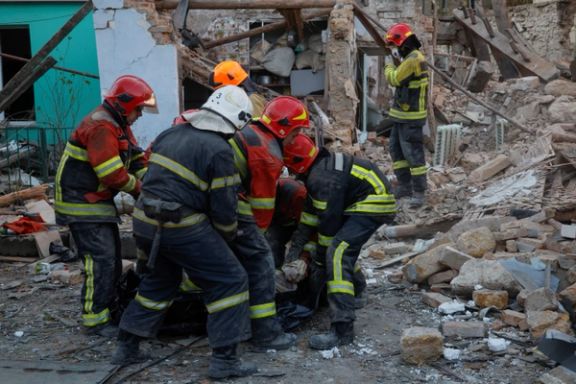
Tehran is preparing the dispatch of surface-to-surface missiles to Russia for use in Ukraine, CNN said Tuesday, citing “officials from a western country.”
CNN described the shipment as the “first instance of Iran sending advanced precision guided missiles to Russia.” It suggested the weapons “could give the Kremlin a substantial boost on the battlefield.”
A senior US defense official said Monday that Washington had no information of Iran preparing to send the missiles. The Washington Post had reported Monday that Tehran planned to send missiles as well as additional military drones.
Robert Malley, the US Iran envoy, on Monday repeated US insistence that Tehran had sent UAVs (unmanned aerial vehicles), saying “those drones have been used to target civilians and civilian infrastructure” in Ukraine while Iran “in the face of all of this evidence, keeps lying and denying that it’s happening.”
The Post suggested that a “relationship of convenience” between Russia and Iran could “redraw regional alliances for decades to come” and that Tehran’s alleged arms sales to Moscow marked “a seismic shift,” while “fears of a new world war have never been greater.”
The newspaper traced Iranian-Russian military cooperation back to fighting to save President Bashar al-Assad in Syria, when their coordinated intervention enabled Assad by 2016 to begin regaining territory from opposition forces, including both the Islamic State group (Daesh) and the US-backed mainly Sunni Free Syrian Army.

But the Post also noted Moscow’s vote December 2006 at the United Nations Security Council to impose sanctions on Iran over its nuclear program, and the two states’ current rivalry over selling oil to China. It attributed today’s closer Tehran-Moscow relationship to shared experience of US and European sanctions.
Intense use of UAVs
With Ukraine deploying drones supplied by the US and Turkey to defend against the Russian invasion, the use of UAVs has been more intense than in many recent conflicts, due in part to drones’ relatively low costs and ability to breach defense systems designed to stop missiles.
But Iran’s large scale export of missiles and drones is seen by the West as a dangerous turn of events because Tehran could use future opportunities to arm countries opposed to NATO or the United States
Russia Saturday suspended a UN-brokered arrangement allowing grain shipments through the black sea after a drone attack on at least one Russian warship near Sebastopol. Moscow said the strike had been planned with British involvement. The UN initiative facilitates the export of both grain and fertilizer, especially to Africa and the Middle East.
An additional $275-million US military package announced by the Pentagon Friday was smaller than earlier packages, with disquiet in the Republican Party shown in objections to plans to fund Ukraine with seized Russian assets.
The British defense ministry said Friday Moscow had adopted a “long-term, defensive posture,” while Vitali Klitschko, Kyiv mayor, said people would freeze to death if western counties did not supply blankets and generators. Associated Press reported Monday that Russia was hiring US-trained Afghan special forces to fight in Ukraine.